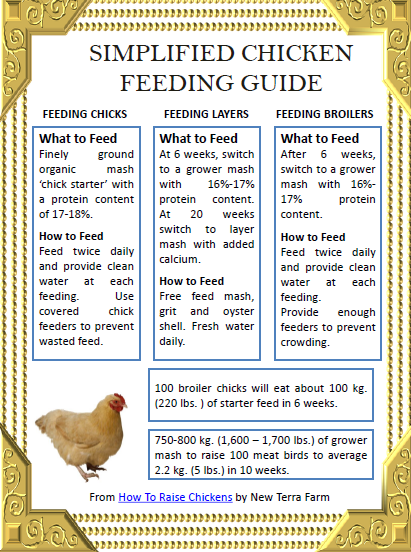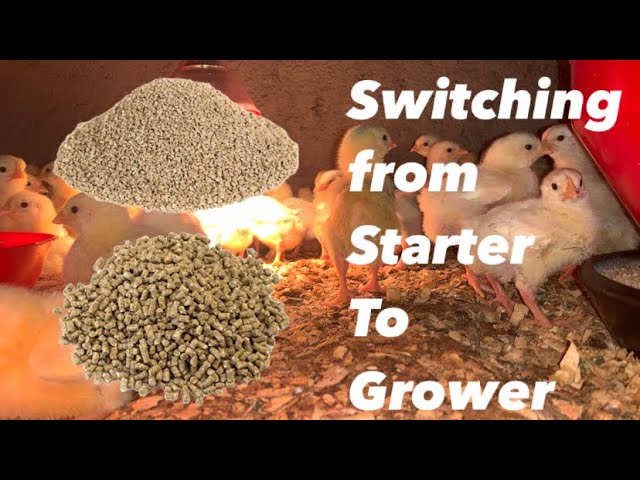Last Updated on December 28, 2023 by Pauline G. Carter
Switching feeds from starter to grower should be done when your young animals reach a certain age or weight, typically around 6 to 8 weeks old or when they reach a specific weight range. This transition ensures that they receive the appropriate nutrition for their growth and development.
As your animals grow, their dietary needs change, and switching feed types helps provide them with the necessary nutrients for their age and developmental stage. It is important to monitor their progress and consult with a veterinarian or animal nutritionist for specific feeding recommendations for your particular animal species.
Switching feeds at the right time can promote healthy growth and help your animals reach their full potential.

Credit: www.youtube.com
Chick Feeding Stages
Easily transition your chick’s feed from starter to grower with an understanding of the feeding stages. Know the right time to make the switch for optimal development and growth.
When raising chicks, understanding the different feeding stages is crucial for their overall health and development. As chicks grow, their nutritional needs change, and it is essential to provide them with the right feed at the right time. The two key feeding stages for chicks are the starter feed stage and the grower feed stage. In this blog post, we will explore when to switch feeds from starter to grower and the importance of each feeding stage in the chicks’ growth and development.
Starter Feed
During the initial weeks of a chick’s life, they require a specialized feed known as starter feed. Starter feed is specifically formulated to meet the nutritional needs of young chicks, providing them with the essential proteins, vitamins, and minerals necessary for healthy growth. The starter feed is typically high in protein, giving the chicks the energy they need to develop strong muscles and feathers. It also contains the appropriate levels of calcium and other essential nutrients to support their bone development.
It is recommended to feed chicks with starter feed from hatch until they reach around 4 to 6 weeks of age. At this stage, their digestive systems are still developing, and starter feed ensures they receive the balanced nutrition they require for optimal growth and feathering. Feeding chicks starter feed during this period will help them develop into healthy, thriving birds.
Grower Feed
Once chicks reach around 4 to 6 weeks of age, it is time to switch from starter feed to grower feed. Grower feed is formulated to meet the changing nutritional needs of the developing chicks as they transition from baby chicks to young pullets or cockerels. It contains lower levels of protein compared to starter feed, as the chicks’ growth rate begins to slow down during this stage.
Grower feed continues to provide the necessary vitamins, minerals, and nutrients to support the chicks’ growth. It helps them develop strong bones, muscles, and internal organs. The reduced protein content in grower feed is important to prevent overgrowth, as excessive protein intake can lead to issues such as obesity and skeletal abnormalities.
Switching to grower feed at the appropriate time is crucial to prevent nutritional imbalances and ensure the chicks continue to thrive. It is generally recommended to feed chicks with grower feed until they reach the point of lay, which is around 16 to 20 weeks of age for most breeds. At this point, they can transition to a layer feed specially designed to support egg production.
The different chick feeding stages and knowing when to switch feeds from starter to grower is essential for raising healthy and strong chickens. Providing the right feed at the right time ensures that chicks receive the necessary nutrients for their growth and development. Remember to transition to grower feed around 4 to 6 weeks of age, allowing the chicks to continue thriving on their journey to adulthood.
Factors To Consider
Switching from starter to grower feeds is an important decision for optimal poultry growth and development. Factors to consider include the age and weight of the birds, their overall health, and the nutritional needs specific to each stage of growth.
Proper feed transition ensures the best outcomes for your flock.
When it comes to switching feeds from starter to grower, there are several important factors you should consider. Making the switch at the right time is crucial for the health and development of your chicks. Below are four key factors that will help you determine the ideal time to transition to grower feed.
Age Of Chicks
The age of your chicks plays a significant role in deciding when to switch their feed. Typically, chicks should be fed starter feed from day one until they reach a certain age. As a general rule of thumb, most experts recommend switching to grower feed when the chicks are around 4 to 6 weeks old. At this stage, their digestive systems are more mature and better equipped to handle the higher nutrient levels found in grower feed.
Weight Of Chicks
Weight is another important factor to consider when deciding to switch feeds. Chicks need to reach a certain weight before transitioning to grower feed, as it contains a higher protein content. It is generally recommended to switch feeds once the chicks have reached an average weight of 4 to 5 pounds. This weight range ensures that the chicks have developed enough muscle and body mass to benefit from the additional protein in the grower feed.
Activity Level
Monitoring the activity level of your chicks is crucial in determining when to switch feeds. Chicks that are more active and constantly on the move indicate that they have developed enough energy stores to handle the higher calorie content in grower feed. If your chicks appear sluggish or have reduced activity levels, it may be a sign that they are not ready for grower feed. In such cases, it is best to delay the transition until they become more active and show greater signs of vigor.
Growth Rate
The growth rate of your chicks is a key indicator to consider when making the feed transition. If your chicks are growing at a slower pace than expected, it may be best to stick with starter feed for a longer period. On the other hand, if your chicks are growing rapidly and putting on weight quickly, it may be time to introduce grower feed. Monitoring their growth rate closely will ensure that you make the switch at the right time, providing them with the necessary nutrients for optimal growth.
The age of chicks, weight of chicks, activity level, and growth rate should all be considered when deciding to switch feeds from starter to grower. By carefully observing and assessing these factors, you can ensure that your chicks receive the appropriate nutrition at each stage of their development. Remember, a smooth and timely transition to grower feed will set the foundation for healthy and thriving chickens in the future.
Transitioning From Starter To Grower Feed
Transitioning from starter to grower feed is an important step in ensuring the healthy growth and development of your chicks. Starter feed is specifically formulated to provide the necessary nutrients for newly hatched chicks, while grower feed is designed to meet the nutritional needs of growing birds. It is crucial to make this transition at the right time to support their growing bodies and promote overall health.
Gradual Transition
Switching from starter to grower feed should be done gradually over a period of time. Abrupt dietary changes can cause digestive disturbances and stress to the birds. To ensure a smooth transition, start by mixing small amounts of grower feed with their starter feed. Increase the proportion of grower feed gradually over the course of a week or two until the chicks are eating only grower feed.
Monitoring Chicks
It is essential to closely monitor your chicks during the transition from starter to grower feed. Keep an eye on their appetite, behavior, and overall health. If you notice any changes such as decreased appetite, lethargy, or abnormal droppings, it may indicate a problem. In such cases, consult a veterinarian to rule out any underlying health issues and adjust the feed accordingly.
Regularly weigh your chicks to ensure they are growing at a healthy rate. A sudden or significant drop in weight gain can be a sign that they are not getting enough nutrients from their feed. Adjust the feeding amounts accordingly to meet their growing needs.
Transitioning from starter to grower feed is a critical step in raising healthy and thriving birds. By following a gradual transition approach and monitoring your chicks closely, you can ensure they receive the right nutrition at each stage of their growth. Remember, a well-balanced diet plays a vital role in their overall well-being and future productivity.
Benefits Of Grower Feed
Switching feeds from starter to grower at the right time is crucial for the healthy development of your animals. Grower feed provides numerous benefits that support their growth and overall well-being. In this section, we will delve into the advantages of using grower feed for your animals.
Balanced Nutrition
One of the key benefits of grower feed is its ability to provide balanced nutrition to your animals. It contains a well-rounded mix of essential nutrients including proteins, vitamins, and minerals, ensuring that your animals receive all the necessary components for their growth. The balanced nutrition offered by grower feed supports their immune system, bone development, and overall health.
Promotes Healthy Growth
Grower feed is specifically formulated to meet the nutritional needs of developing animals. With a higher protein content than starter feed, it promotes healthy growth and proper muscle development. Additionally, the carefully selected ingredients in grower feed help in building strong bones and a robust skeletal structure. By providing the necessary nutrients for growth, grower feed ensures that your animals develop into healthy and thriving individuals.
Suitable For Long-term Feeding
Another advantage of grower feed is its suitability for long-term feeding. As your animals progress from the starter stage to the growing stage, they require a feed that can adequately meet their changing needs. Grower feed is designed to be fed to animals for an extended period, ensuring that they continue to receive the necessary nutrition throughout their growth journey. This eliminates the need for frequent feed transitions, simplifying the feeding process and providing consistent nutrition to support their ongoing development.
Common Mistakes To Avoid
Switching feeds from a starter to a grower is a critical stage for every poultry farmer. To ensure the healthy growth and development of your birds, it is important to time this transition correctly. However, many beginners tend to make common mistakes that can have detrimental effects on the overall well-being of their flock. In this post, we will discuss three common mistakes to avoid when switching feeds from starter to grower. These mistakes include switching too early, switching too late, and making sudden changes without proper adjustment. By understanding and avoiding these mistakes, you can make a smooth transition and provide the best nutrition for your poultry.
Switching Too Early
Switching feed too early is a mistake that can hinder the growth and development of your birds. It is essential to remember that starter feeds are specifically formulated to meet the nutritional needs of young chicks. These feeds contain higher levels of proteins and essential nutrients to support rapid growth during the early stages of life. Switching to grower feed too early can deprive your birds of the necessary nutrients, resulting in stunted growth and weakened immune systems. It is crucial to allow your chicks to reach the appropriate age and size before making the switch.
Switching Too Late
On the other hand, switching to grower feed too late can also have negative consequences. Although starter feed provides essential nutrients for young chicks, it may lack the appropriate balance for older birds. As they grow, their dietary needs change, requiring different nutrient ratios to support healthy growth and development. Delaying the switch to grower feed may lead to excessive weight gain, nutritional imbalances, and even problems with bone and muscle development. It is important to monitor the growth milestones of your birds and switch to grower feed at the right time.
Sudden Changes
Making sudden changes to your birds’ diet without proper adjustment can disrupt their digestive system and cause health issues. Poultry have sensitive digestive systems, and sudden shifts in their feed can lead to digestive disturbances, such as diarrhea and malnutrition. When transitioning from starter to grower feed, it is essential to provide a gradual adjustment period. This period allows your birds’ digestive system to adapt to the new feed gradually. Start by mixing small amounts of grower feed with the starter feed, gradually increasing the ratio over a few days until you have completely switched to the new feed. By making gradual changes, you can minimize the risk of digestive issues and ensure a smooth transition for your birds.

Credit: www.new-terra-natural-food.com

Credit: www.youtube.com
Frequently Asked Questions For When Do I Switch Feeds From Starter To Grower?
When Should I Switch From Starter To Grower Feed?
Switch from starter to grower feed when your chicks reach a certain age, usually around 4 to 6 weeks old. This feed is designed to meet the nutritional needs of growing birds, providing them with the right balance of protein, vitamins, and minerals for their development.
How Long Should I Keep My Chickens On Starter Feed?
Chickens should be kept on starter feed for about 6-8 weeks. It provides essential nutrients for their growth and development. After this period, you can gradually transition them to grower feed. Remember to provide fresh water and monitor their health to ensure they thrive.
Can I Mix Starter And Grower Feed?
Yes, it is possible to mix starter and grower feed. However, it is important to do so in the correct ratios and gradually transition between the two. Consult with a poultry nutrition expert to ensure the mix meets the nutritional needs of your birds at each stage of growth.
When Should I Start My Growers Mash?
Start your growers mash as soon as your plants show signs of growth, typically around Spring. It’s important to give them a nutrient-rich boost early on to support healthy development.
Can I Switch My Feeds From Starter To Grower Before The Recommended Time?
It is not recommended to switch feeds before the suggested time, as it may affect the growth and development of the animal.
Conclusion
Switching feeds from starter to grower is an important decision that poultry farmers need to make at the right time. By considering factors such as the age and development of the birds, it becomes clear when the transition is necessary.
Providing the appropriate nutritional content from a grower feed ensures optimal growth and performance for the poultry. Remember, a well-timed switch promotes healthy development and contributes to successful poultry farming.


